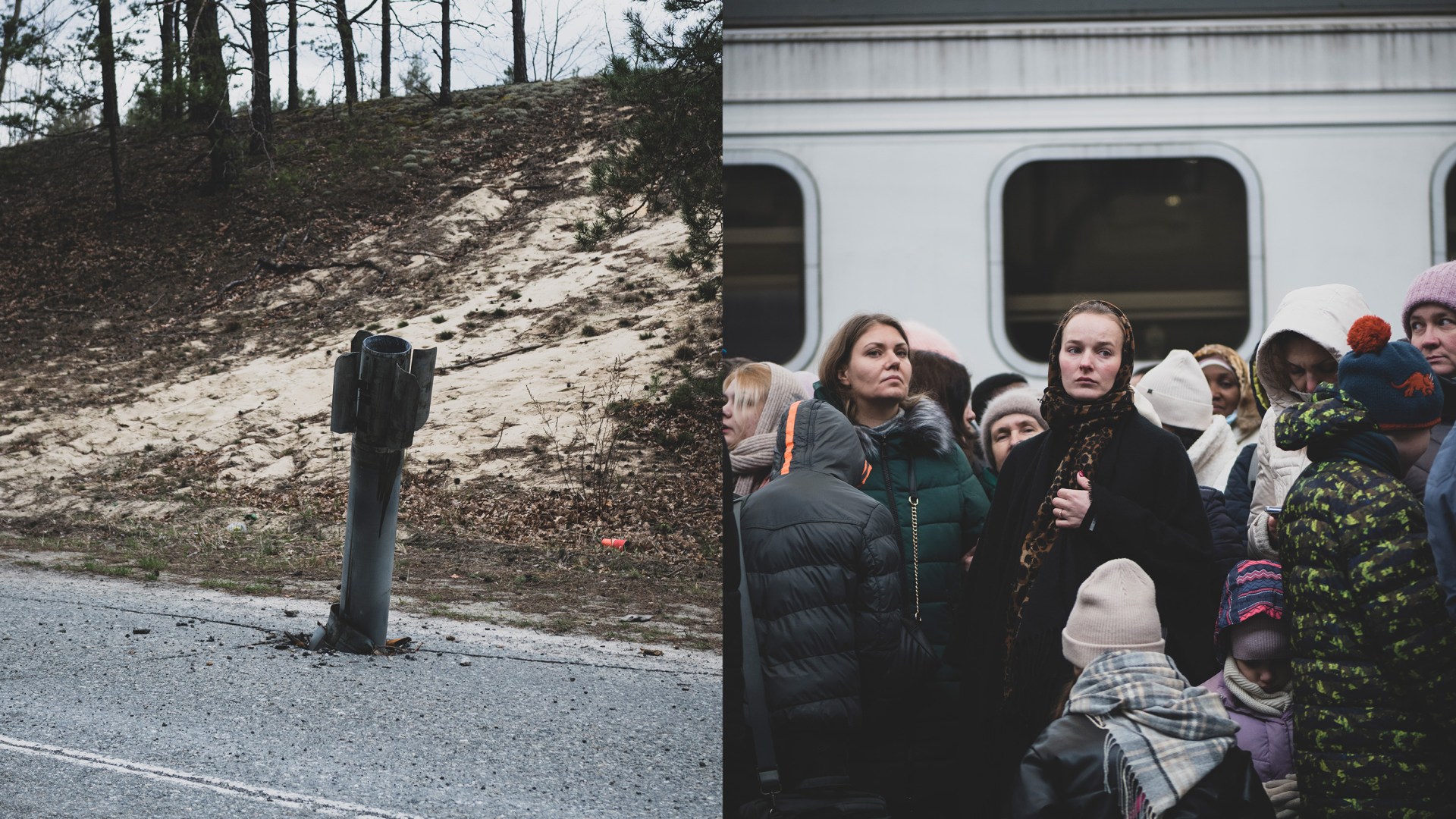It was 2:30 in the morning on February 24 when Maksym Maliuta finally fell asleep. That night, he had been arguing with his college classmates, who dismissed warnings of a Russian invasion of Ukraine as “Western media panic.” No, Maksym insisted, the signs were all there: Vladimir Putin was building up to a massive military operation.
Maksym had been asleep two hours when his phone rang. Russian airstrikes were raining on cities across Ukraine, his cousin called to tell him. Maksym went online and found a video of missiles exploding in Kharkiv, Ukraine’s second-largest city. Then he went into his parents’ room and woke them with the news: Putin was attacking their country.
When Maksym walked to the bathroom to wash up, the shock finally splashed him full in the face, and he began shaking. The possibility of a Russian invasion had been looming in his consciousness since he was 10, when Russia annexed Crimea in 2014. And yet, it seemed unreal when it actually happened, “like a nightmare that finally came true.”
It should have been a relief that the Maliutas were, in fact, half a continent away from their home in Kyiv.
Maksym’s father, Ruslan, works with international evangelical ministries, and whenever people outside of Ukraine asked for his thoughts, Ruslan had answered, “War is possible, but unlikely.” But in mid-January, while on a prayer walk, Ruslan began wondering if, as a father of five children, he ought to prepare an evacuation plan, just in case. He reached out to a friend who owns a chalet in the Swiss mountains. That friend offered the chalet as a temporary safe place to his family but advised, “If I were you, I’d think about coming soon.”
Until then, the idea of leaving Ukraine had been hypothetical. But as Ruslan and his wife, Anya, prayed, they felt a nagging sense that they shouldn’t wait. They needed to go soon.
Within a few days, the Maliutas piled their luggage into the family van and headed toward Switzerland with mixed feelings. Ruslan wasn’t sure what to expect; they could return home in a month or never see home again. Anya expected they would be back in two weeks.
Maksym, their 18-year-old oldest son, was the most pessimistic: He feared war could erupt at any moment, that bombs might strike Ukraine before they even made it out of the country. When they finally crossed the Ukraine-Hungary border, he felt relief, then sadness. “I had a very strong feeling that we’re not going to be back home for a long time.”
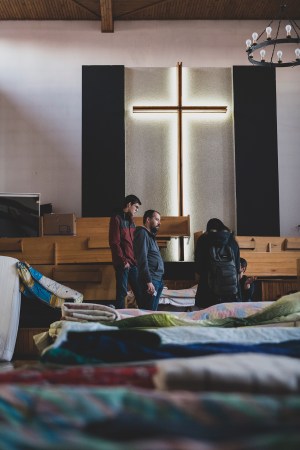 Photo by Joel Carillet for Christianity Today
Photo by Joel Carillet for Christianity TodayA month later, when the invasion began, the Maliutas had temporarily relocated to an Airbnb in southern France because of a scheduling conflict at the chalet. They were turning it into a mini seaside holiday, hiking and strolling on the beach. But word of the war, 1,800 miles away, arrived like a storm cloud and blotted out the beauty and warmth of the French coast.
For hours, Ruslan and Maksym fixated on their devices, watching their country turn to smoke and rubble. It felt surreal. Ruslan recognized a building that was ripped apart by a missile: It was a short walk from the hospital where all five of his sons were born. A friend called to tell them he was fleeing Kyiv with his wife and son, without a clue where they were going. When a garbage truck pulled up near the house making loud popping sounds, Ruslan jumped in fright.
As the family finally went out for a walk to take a break from the news, Ruslan gazed at the happy people at the beach, uncomprehending, feeling as though he were observing life through a screen. “There was a crystal-clear sense that life has changed.”
For tens of millions of Ukrainians, February 24 sliced time into two eras: before and after. For Ruslan and Maksym, the weeks after felt like one unending, nightmarish day. But the family had a decision to make: How would they respond? Who would they become in the new era?
Ruslan recalled Viktor Frankl, a psychiatrist and Holocaust survivor, who once observed that those who found meaning and purpose were able to survive the horrors of concentration camps, whereas those who clung to unrealistic optimism or gave in to despair were doomed.
“We are living in a time of big changes,” Ruslan said. “We don’t know what’s coming, but we need to be ready in terms of our relationship with God, our priorities, the foundational things—understanding what those are, and what it means to be ready for whatever’s coming.”
Nobody is ever completely ready for war, even those who take precautions.
On paper, Julia Sachenko was more ready than most. She leads the Ukraine branch of A21, a global anti–human trafficking organization. Because Sachenko and her team work for an international group, A21’s security staff worried that, should Russians occupy Ukraine, they might suspect Sachenko and her team were spies. A21 advised Sachenko’s team, including spouses and children, to relocate from Kyiv to a country house 25 miles outside the capital.
On February 12, the entire staff moved into that house and began working there together, not knowing what to expect. When nothing seemed to happen, they got antsy, missing home. Sachenko convinced them to stay put until February 25. But on the 24th, Russian troops entered Ukraine.
Sachenko and her team hastily packed their bags. She had two suitcases—one stuffed with clothes for her and her children, the other with work documents. Her husband helped her carry their two boys, ages four and six, to her Volkswagen Tiguan. They looked up at the missiles flaring overhead. Then they kissed goodbye. They had previously agreed that should something happen, he, a pastor in Kyiv, would stay behind with his congregation while Sachenko took the kids to safety in Poland.
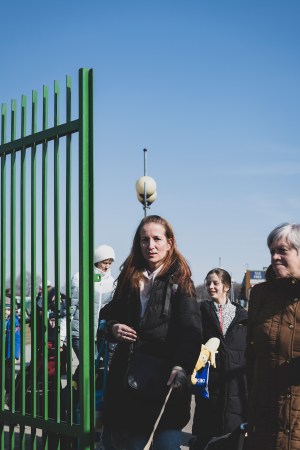 Photo by Joel Carillet for Christianity Today
Photo by Joel Carillet for Christianity TodayFor her boys, Sachenko tried to pretend like they were on a road adventure. But she could barely see the road through her tears. A staff member riding with her read Psalm 91 over and over: “I will say of the Lord, ‘He is my refuge and my fortress, my God, in whom I trust.’ ”
More than 6 million refugees have fled Ukraine, while more than 7 million are internally displaced—about a quarter of the country’s entire population—a scale of human suffering and forced displacement that, according to the United Nations, “far exceeds any worst-case scenario planning.”
Sachenko is one of more than 3 million refugees who crossed the border into Poland, a country of 38 million, where refugees from Ukraine are eligible for work permits, free health care, schooling, and bonuses for families with children. The vast majority of them are women and children arriving unemployed, bereft, and traumatized. Most say they plan to return home. But even if the war ended today, it would take months and years for some to go back while Ukraine rebuilt its economy and infrastructure and removed the land mines scattered like confetti across its terrain.
Even when the war has seemed to abate—such as in early April, when the Russian military retreated from the northern regions to focus assaults on the south and the east—many refugees said they feel stuck in limbo. They don’t know when it’s safe to return home or what to do in the meantime.
Sachenko was still in her car when she realized exactly what she’d be doing during her exile.
It took her and her team two days and two nights to clear the Hrushiv-Budomezh border crossing. The line of cars there was more than two dozen miles long. Sachenko estimates they traveled about 20 inches every 20 minutes. While her kids dozed fitfully in the backseat, she pinched herself awake in the dark. They relieved themselves behind bushes that stank of human excrement and dined on cookies and chocolate until a local man offered them hot borscht, tea, and hard-boiled eggs.
At the checkpoint, Sachenko was troubled by the huge and chaotic crowds, mostly women with children lugging suitcases and backpacks. People pushed against each other, kids sniffled and cried, and husbands and fathers hugged their families goodbye as border guards turned away adult Ukrainian men, most of whom are prohibited from leaving the country in case they’re needed to fight.
Sachenko saw strangers in private cars offering rides all over Europe. After more than 10 years in anti-trafficking work, her trained eyes flitted among all the signs of trafficking risk. Many of these strangers acted out of kindness and compassion, but how many were predators, pouncing on a litter of desperate, vulnerable victims willing to accept any help?
She recognized a critical need then—one that her team was uniquely positioned to fill. Sachenko and her staff spoke Ukrainian and understood the mindset of wartime refugees, since they were becoming refugees themselves. Now here they were, entering the country that was receiving more Ukrainian refugees than any other.
When they finally crossed into Poland, the face greeting them was no stranger: The pastor of Zoe Church in Warsaw had waited for them at the border for two days in below-freezing weather. By the time Sachenko’s team made it to Warsaw, Zoe Church had booked hotel rooms for them and would soon find them an apartment.
A staff member’s daughter had turned eight and Sachenko’s son had turned seven at the border, so the pastor’s family prepared a chocolate birthday cake, presents, and chocolate eggs for the children—a small gesture that sparked delight in both kids and adults.
But Sachenko’s mind was already turning toward vulnerable refugees who didn’t have a welcome team awaiting them. She committed to staying in Poland at least six months to do what she could to help.
“I don’t think God brought us to Poland by chance,” Sachenko told her team. “We are here for such a time as this.”
They had work to do.
“For such a time as this.”
I heard this phrase often during my reporting. War may be senseless, but the Christian response has profound, eternal implications. “The church has always preached, ‘Love God, love people,’ ” said Czeslaw Kusmider, a pastor in Przemyśl, Poland, whose congregation worked around the clock to host more than 40 refugees a night. “Now God is saying, ‘I want to check the love that you say you have for me and people.’ We’re not just saying it anymore—we’re doing it.”
Polish pastors say they don’t know of any church in Poland that’s not in some way helping Ukrainians. In many towns, churches were the first responders: They retrieved refugees from the border; fed, clothed, and housed them; helped enroll kids in school; connected them with churches in other cities; prayed for them; and baptized them. Though most churches lack the resources of government bodies and international aid groups, when banded across cities and countries and denominations like a railroad network, they were able to act instantly, evolving their services swiftly and effectively without being encumbered by government bureaucracy.
Many churches in Poland have small congregations; some can barely afford a full-time minister. God’s Light Church in Lublin, for example, has only 30 members, mostly college students and fresh graduates. When I visited, they were housing about 60 refugees a night in four different locations.
How does a 30-member church host a group twice its size? Jan Lukasik, 22, smiled and flexed his arm: “We have very strong faith in God.” Lukasik and his Ukrainian wife, Ania, got married in January. Since February 24, Ania’s cellphone has been buzzing nonstop with messages from Ukrainian refugees. She quit her job as a child psychiatrist to serve them full time. The day I met the Lukasiks at one of the church-run shelters, Ania’s phone was still pinging every few minutes. “Putin took my wife,” Jan half joked.
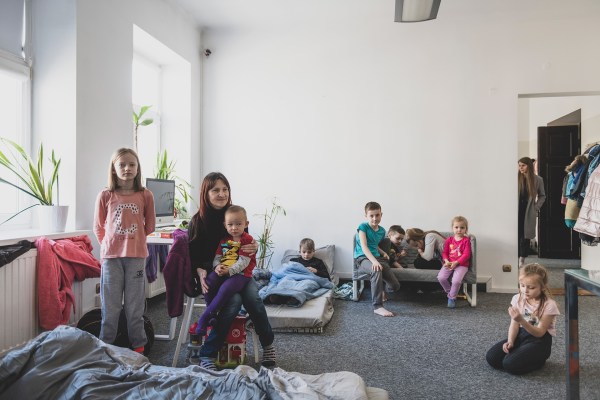 Photo by Joel Carillet for Christianity Today
Photo by Joel Carillet for Christianity TodayGod’s Light Church holds prayer meetings every evening at its four shelters—rooms in office buildings and an apartment. Volunteers share the gospel or offer prayers whenever they can. Ania said at first she was nervous that people would resent God, asking why he would allow such terrible things to happen. But nobody did, and nobody rejected offers of prayer.
“In times of death and suffering,” she said, “God is the only hope. We see all this evil around us, but we also see God in people—people who are neither rich nor powerful but still do everything they can to share the love of God.”
All over Poland, churches have doubled in size. “Everyone’s a believer now,” said Andrii Kokhtiuk, a pastor in Ząbki, a town northeast of Warsaw. “They’re all crying out to God. The soil is ripe for growing and planting.”
Some Christians feel God is using Ukrainian refugees to bless the Polish people. Less than 0.1 percent of the Polish population identify as evangelical Christians, and though a majority identify as Roman Catholic, less than half regularly attend mass, and many view Catholicism as just part of Polish culture.
Meanwhile, Ukraine has been an incubator for evangelical megachurches, seminaries, charities, and missions since the 1990s, after the Soviet Union dissolved. While many European countries secularized, Ukrainian churches sent thousands of missionaries to Russia, Central Asia, and Europe. Now many of these evangelicals are being scattered in a mass exodus from Ukraine. “We’re involuntary missionaries to the whole of Europe,” Kokhtiuk said.
Jonasz Skrzypkowski, whose father pastors Chełm Baptist Church in Chełm, a city 15 miles west of the Polish-Ukrainian border, said he was amazed by the faith of the refugees. He met one couple in their late 60s who crossed the border from Irpin with their two granddaughters. They had just bought a house with their entire life savings, but Russian shelling smashed that house like a cookie. The couple didn’t know where to go. “‘But God knows our path,’” Skrzypkowski said they told him. “They kept saying, ‘Praise God, praise God.’ They had no resentment, no blame towards God. Can you imagine?”
Chełm Baptist Church was the first in its area to open a refugee shelter. The first day, 20 people showed up. The second, 120. On the third day and every day for weeks after, 200 people came. At first, the 80-member congregation was apprehensive. They were already struggling to pay the church bills. How could they handle hundreds of refugees?
“So we took a leap of faith,” Skrzypkowski said. He used his credit card to purchase new mattresses. The little church served 350 hot meals a day through the help of local restaurants and neighbors. Thanks to donations, the church sent five trucks to Ukraine packed with food and supplies worth $40,000 per truckload. Its regular annual budget is $50,000.
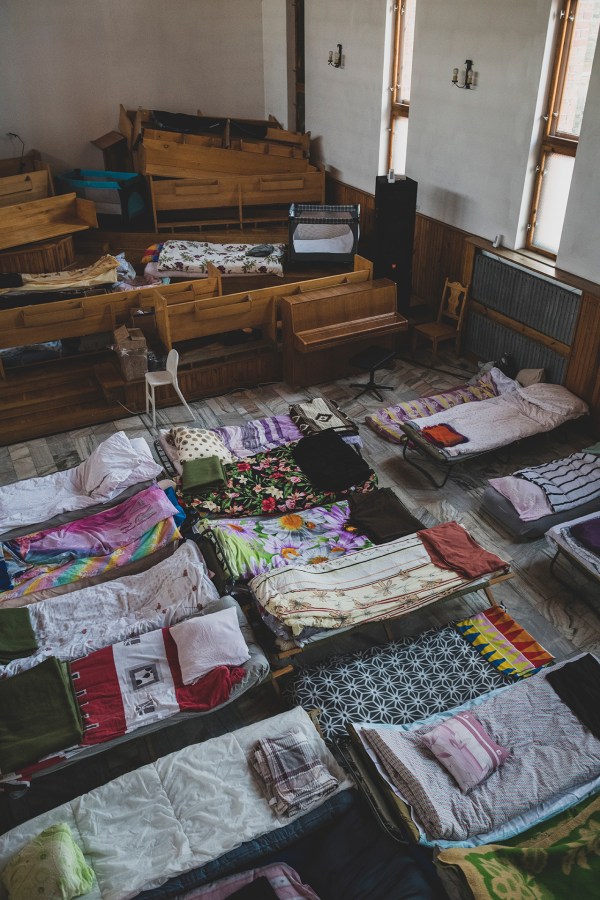 Photo by Joel Carillet for Christianity Today
Photo by Joel Carillet for Christianity Today
“God completely changed us,” said Jonasz’s father and the church’s pastor, Henryk. “We woke up from our comfortable life. Now we truly understand what it means to be the body of Christ.”
The day I met Jonasz, he looked exhausted. He sank onto the steps in front of the pulpit, groaning. It had been a while since he’d sat down. But he also looked hopeful. “We pray God will use the people in Ukraine,” he said, “just like God used the Jewish diaspora from Jerusalem to spread the gospel to us.”
Ukrainians told me they are overwhelmed and encouraged by the outpouring of support and compassion from other countries. When Ruslan and Maksym Maliuta traveled to Poland to introduce me to churches and ministries helping Ukrainians, they gazed around in amazement. Wherever they turned at the Warsaw Chopin Airport, they saw people cheering for Ukraine, the yellow-and-blue Ukrainian national flag, signs and posters offering aid to Ukrainians, and social workers in bright vests speaking in Ukrainian. Even the flight attendants of their Polish plane had pinned the Ukrainian flag to their breast. “It felt a bit like home,” Ruslan mused.
Besides his day job working with a global children and youth ministry called OneHope, Ruslan leads a special task force on Ukraine for the World Evangelical Alliance (WEA). So far, WEA is financially supporting about 20 evangelical denominations and church networks in Ukraine, Poland, Slovakia, Moldova, Romania, and Hungary based on Ruslan’s connections. That work, Ruslan knows, would have been far more difficult or even impossible if he were still in Ukraine, preoccupied with his own family’s survival under siege.
When he met me in Poland in March, he was officially there for the WEA. But he and Maksym also had personal goals: They yearned for some relief from their sense of helplessness and distance. “Everyone—all Ukrainians who are not in Ukraine—have survivor’s guilt,” Maksym told me. “You feel like your whole nation suffers, and you’re not there.”
Throughout the trip, I watched him scroll constantly through channels on the messaging app Telegram, silently reading about a hospital and school in Mariupol that were bombed, about the 96-year-old Holocaust survivor killed in Kharkiv. He absorbed the information with numbness. Logically, he understood the calamities of war—but the reality didn’t quite hit him until he stood at a warehouse of emergency supplies bound for hot zones in Ukraine.
There, volunteers wearing yellow “Pray for Ukraine’’ vests were packing medical supplies and first aid kits that would go to Ukrainian soldiers on the front lines. They forklifted pallets of canned beef, cooking oil, buckwheat, flour, sugar, and diapers into 10-foot trucks. Almost all these volunteers were Ukrainians, many refugees. That was when Maksym grasped the magnitude of the war: all this food, going to real people. To his people.
When war broke out, the Pentecostal Church for Ukraine in Warsaw, a Ukrainian immigrant church, received so many donations from locals and other churches in Europe that boxes and crates spilled out of their rented church space. Before he had shipped a single truckload to Ukraine, lead pastor Oleksandr Demianenko knew he’d need to rent an actual warehouse.
That warehouse is now a bustling hub for Ukrainians from all over the world. Refugees, missionaries, ministry leaders, and volunteers from Ukraine, North America, Estonia, the Netherlands, Spain—a once-scattered diaspora congregates in this Warsaw building through a common identity, faith, and mission.
The first several days after the war started, Demianenko’s prayers were mostly tears. He cried for three days under the weight of death, suffering, and hopelessness. He canceled regular church services and called his congregation to pray. It was time to get ready for action.
Since February 24, the cellphones of church members have been blowing up with calls and messages from churches in Ukraine requesting help. “I couldn’t even use the toilet,” one deacon told me. He estimated he had received more than 5,000 messages in one month.
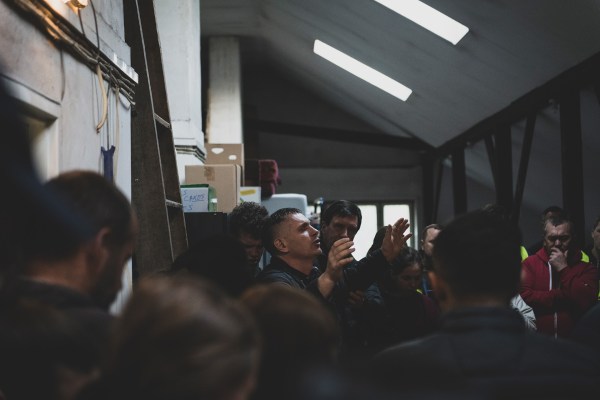 Photo by Joel Carillet for Christianity Today
Photo by Joel Carillet for Christianity TodayThe church quickly developed a streamlined system for their warehouse. They built a coordination team. They kept a fast-moving waitlist of requests from church leaders for supplies and evacuation. They calculated the cost of each truckful of supplies and slashed costs by ordering products directly from factories. They also mobilized a network of churches from Europe to North America to send donations and supplies to the warehouse, provide transportation for evacuation, or offer shelters for refugees. Most days, Demianenko marches about the warehouse from morning till midnight, meeting with church leaders and coordinating each day’s route for the delivery trucks.
“I’ve never seen anything like this before,” he said. “Before, everyone was fighting for bread for himself. Now, everyone is fighting to give bread.” This, he declared, is “extraordinary and supernatural. This is God.” He grinned wide. “And it’s only the beginning. We will be different after this. We will change”—he tapped his heart—“here.”
Demianenko said he believes God called him to Poland in preparation for this crisis. “I didn’t want to move to Poland,” he recalled. He was comfortable in Ukraine. He owned a house, had a good ministry, and has three young kids and a wife who also didn’t want to move to Poland. “But God told me, ‘You won’t understand now, but in time, you will.’ All I knew was we had to prepare for something.”
That was about five years ago. Demianenko planted a church in Warsaw, then planted 17 more throughout Poland. The moment war began, this entire network of churches “turned on right away,” Demianenko said. “We were ready because we were already so well connected.”
But he was clear that his church’s original mission has not changed: “We will follow Jesus Christ. We will spread the gospel until Christ comes back. We will fulfill God’s will. We will love our enemies—even the Russians.”
Daily reminders of war puncture the buoyant energy at the warehouse. The day I met Demianenko, he had just gotten word that Russian forces allegedly fired at vans from his warehouse near Borodyanka, northwest of Kyiv. One driver was killed, another was wounded and died later in the hospital, he told me. A refugee volunteer at the warehouse recently received news from relatives in Mariupol: His nephew had gone out to collect baby food and apparently walked into Russian artillery. His family collected his body parts and buried him in their yard.
These stories and the relentless headlines struck close to home for the Maliutas when they received a call from a relative in late April: A cousin of Ruslan’s wife, Anya, had died in Mariupol, perhaps in a building collapse. So had two of her children, reportedly shot by Russian soldiers.
When people argued about the pros and cons of enforcing a no-fly zone or sanctions from the West, Ruslan would shake his head: “I’m so past theoretical discussions.”
When he moved among the sophisticated skyscrapers and giant, westernized malls of Warsaw, Ruslan remembered what his country has lost: “This could have been Ukraine in a few years.”
At the Warsaw Central railway station, Ruslan stood for a long time on the second-floor balcony, looking down at masses of weary refugees. The train station used to evoke anticipation of adventure and vacation. “But there, you could sense the apprehension,” Ruslan said. “None of them are there by choice.”
Their needs are critical and long-term, causing some to worry about the societal backlash as Poland groans under the weight of almost three million refugees streaming in.
“I’m not too optimistic,” said Bishop Marek Kaminski, who heads the Pentecostal Church of Poland, a denomination of 275 churches.
Kaminski had been vocal about supporting refugees back in 2015 during the migration crisis, when Poland, along with Hungary, closed its doors to refugees from Africa and the Middle East. Opinion polls then showed that about three-quarters of Polish people disapproved of accepting refugees. Today they’re responding very differently with the Ukrainians, who share a similar culture, language, and background. Currently, many Polish people and leaders are “moved by emotions,” Kaminski pointed out, but what happens when those feel-good emotions dry out?
“On a personal level and as a society, we want to love our guests, but our lives have changed to a degree that we don’t want it to.” Yet the gospel calls Christians to a different kind of life, he said.
In January, Kaminski had preached a sermon calling his church to become an “apostolic church.” He urged churches in Poland to pray globally: “It’s time for us to stop being concerned only with ourselves. It’s time for us to look at other people.” He didn’t realize then that he was being prophetic. He added, “Now, two months later, everyone is praying for Ukraine. Two months later, millions of relationships are being formed across nations. … We became an apostolic church. This is our apostolic mission.”
In Warsaw, Julia Sach-enko is also busy with a mission—and her life has changed to something she never wanted. She’s functionally a single mother, a refugee who’s leading international anti–human trafficking awareness and prevention campaigns for Ukrainian refugees. Sometimes, in the middle of the day, Sachenko startles to a jolt of surrealism: Is this a dream? Am I really in Warsaw because my country is at war, separated from my husband while people are dying and trafficked?
At times, Sachenko just wants a long, long nap. “But we realize we cannot rest right now. It’s not our time to rest.” She believes her team has the specific skills, expertise, and experience Europe needs right now. If the A21 team took a break, relief and deliverance would surely come from other places, “but what will happen with us?” she said, referencing Esther 4:14. “God has prepared us for such a time as this, and if we didn’t do anything? I don’t ever want to be in that position.”
One night, after reading reports of indiscriminate violence in the regions around Kyiv, Sachenko told her husband how overwhelmed she felt. Her husband reminded her of Matthew 24 when Jesus told his disciples not to be alarmed by wars and rumors of wars. “We’ve gotten too used to a comfortable Christianity,” he told her. What’s happening is terrible, but it makes him even more determined to serve and love those who are still alive.
“And I thought, He’s right. He is so right,” Sachenko said.
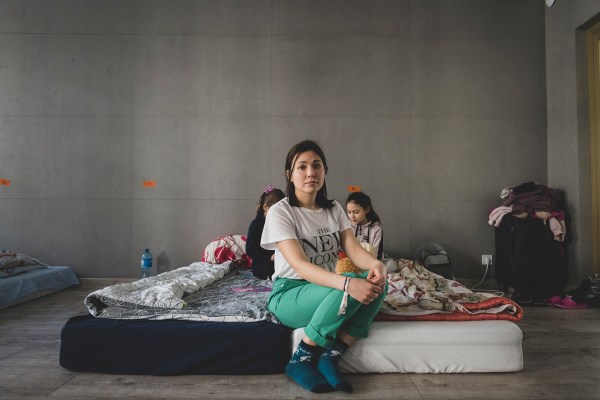 Photo by Joel Carillet for Christianity Today
Photo by Joel Carillet for Christianity TodayAs for Ruslan and Maksym, life in the era after February 24 has also changed. Maksym has stopped obsessively checking the news. He’s trying to find a new normal: taking daily walks, meeting deadlines for school. He’s engaging with friends in Ukraine—not just exchanging facts and news, as he realized he had been doing, but really listening to what’s going on in their lives.
On their last day in Poland, the Maliutas picked up Maksym’s cousin, who had just crossed the border that day. Ruslan had been trying to help his brother’s family get out of Ukraine, but his nephew, who would turn 18 in two weeks, could not wait much longer before he would be barred from leaving. He now shares a room with Maksym in Switzerland.
During dinner, as Maksym and his cousin chatted excitedly, giggling and joking, I was reminded that Maksym is still an 18-year-old college kid. It’s easy to forget how young he really is, how much the war has robbed him of that world-is-your-oyster optimism of youth. Before February 24, his life had stability. He had his family and home, a routine of classes and work, friends and summer plans, career dreams. “But now, I don’t know what will happen tomorrow,” he said. In August, his family will have to leave the Swiss chalet. But to go where?
Even as they struggle with survivor’s guilt, grief, and fear, both Maksym and Ruslan believe they’re there for a reason. Ruslan says he’s encouraged to see Christians in Ukraine doing what a church in a country at war should do. He’s encouraged to see Christians in Europe doing what the church should do for sojourners, foreigners, widows, and orphans. And he’s encouraged that he, too, has a role to play: “We’re where God wants us to be. It’s a reminder that he’s in charge. … He decides where each of us needs to be stationed, and our best response is ‘yes.’ It’s a small part of what God is doing through the church, but I feel blessed that Maksym and I are able to come alongside others.”
Perhaps that’s why, at the warehouse in Warsaw, despite the heavy presence of war, another presence is also tangible, one of hope and anticipation—and even joy. My last night there, during a dinner of Domino’s pizza and Neapolitan ice cream, Demianenko encouraged his group of volunteers to press on in faith: “The Holy Spirit is making us look more like Jesus Christ. When we look like Jesus, we are showing others the way to Jesus. We don’t understand everything, but we continue to trust in Jesus.”
One volunteer called out, “God is good!”
The group chorused back, “All the time!”
“God is good!”
“All the time!”
Sophia Lee is global staff writer at CT.

